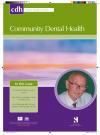Community Dental Health

- Cover Date:
- June 2013
- Print ISSN:
- 0265 539X
- Vol:
- 30
- Issue:
- 2
Caries diagnosis: agreement between WHO and ICDAS II criteria in epidemiological surveys
doi:10.1922/CDH_3006Silla04
Objective: The aim of this study was to ascertain the equivalence between WHO caries diagnosis criteria and the ICDAS II caries classification scale for comparisons in epidemiological studies. Materials and methods: Two intraoral examinations, one using the ICDAS II caries codes and the other the WHO caries assessment method, were performed in a random sample of 101 children (29 aged 5-6 years, 32 aged 12 and 40 aged 15). Both examinations were performed not more than one month apart by two calibrated examiners (one for ICDAS II criteria, Kappa=0.86, and the other for WHO criteria, Kappa=0.91). The DMFT/dft, DMFS/dfs and caries prevalence (DMFT or dfs>0) indices were obtained in accordance with WHO assessment criteria and by applying 5 cut-off points on the ICDAS II scale. The differences between means were analysed with the Wilcoxon test and those between proportions with the McNemar test. Agreement was determined by the intraclass correlation index and the Kappa statistic. Results: The least differences between the WHO and ICDAS II criteria were found at cut-off point 3 (ICDAS II codes 3 to 6). The greatest agreement was found at the same cut-off point. Conclusion: While the equivalence between both methods used in epidemiological studies does not appear to be clear, possible errors could be reduced by locating this equivalence at cut-off point 3 and not at cut-off point 4.
Key words: caries detection, epidemiology, public dental health
- Article Price
- £15.00
- Institution Article Price
- £
- Page Start
- 108
- Page End
- 111
- Authors
- J.E. Iranzo-Cortés, J.M. Montiel-Company, J.M. Almerich-Silla
Articles from this issue
- Title
- Pg. Start
- Pg. End
- Barriers and facilitators that influence the delivery of prevention guidance in health service dental practice: A questionnaire study of practising dentists in southwest England
- 71
- 76
- Care home managers’ views of dental services for older people living in nursing and residential homes in inner city London
- 77
- 82
- Automated coaching to help parents increase their children’s brushing frequency: an exploratory trial
- 88
- 93
- Operationalisation of the construct of access to dental care: a position paper and proposed conceptual definitions
- 94
- 101
- Sociodemographic differences in oral health-related quality of life related to dental caries in Thai school children
- 112
- 118
- Short Communication - The cross cultural adaptation and validity of the Child-OIDP scale among school children in Karnataka, South India
- 124
- 126
- Short Communication - Defluoridation techniques implemented by the government of Karnataka, India – the current situation
- 127
- 128
